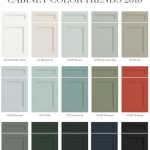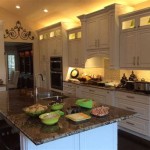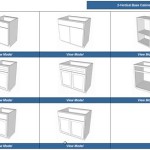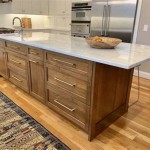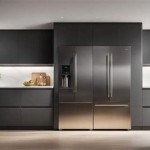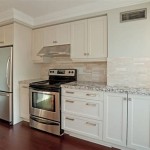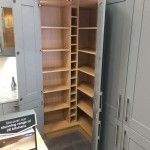Open Kitchen Cabinets: The Doorless Design Trend
Open kitchen cabinets, defined by the absence of doors and sometimes even backs, represent a significant departure from traditional kitchen design. This aesthetic choice prioritizes visibility and accessibility, transforming the function and feel of a kitchen space. The impact of removing cabinet doors extends beyond mere aesthetics; it influences organization, maintenance, and the overall ambiance of the room.
The trend of open kitchen cabinets has gained traction in recent years, driven by a desire for more personalized and visually engaging kitchen environments. It aligns with broader design movements that emphasize simplicity, functionality, and a rejection of unnecessary ornamentation. This design decision also reflects a move towards embracing a more lived-in and authentic aesthetic, where personal belongings and kitchen essentials are openly displayed as part of the overall decor.
Open kitchen cabinets are not simply a matter of removing doors; they require careful consideration of various factors, including the style of the kitchen, the lifestyle of the occupants, and the practical implications of exposing cabinet contents. A successful open cabinet design integrates seamlessly with the existing architecture and enhances the overall flow of the kitchen, both visually and functionally.
The Aesthetic Advantages of Open Cabinets
The primary appeal of open kitchen cabinets lies in their aesthetic contribution to the space. They offer a streamlined and airy feel, making a kitchen appear larger and more open. This is especially beneficial in smaller kitchens where traditional cabinetry can feel bulky and overwhelming. The visual openness created by removing doors allows light to penetrate deeper into the space, enhancing brightness and creating a more inviting atmosphere.
Open shelving provides a canvas for personal expression. Homeowners can curate displays of favorite dishes, cookware, and decorative items, transforming functional storage into a visual showcase. This allows for a greater level of personalization and customization than traditional closed cabinets, which often conceal everything behind uniform doors. The ability to change and rearrange these displays offers ongoing flexibility and allows the kitchen to evolve with the homeowner's changing tastes and preferences.
Furthermore, open cabinets can be used to highlight architectural details within the kitchen. They can accentuate interesting wall textures, tile backsplashes, or unique structural elements. By framing these features within the open cabinet space, designers can draw attention to the inherent character of the kitchen and create a more visually dynamic environment. The contrast between the exposed contents of the cabinets and the surrounding architectural elements adds depth and visual interest to the space.
The style of open cabinets can be adapted to suit a wide range of kitchen aesthetics, from rustic farmhouse to modern minimalist. In a farmhouse kitchen, open shelving can display collections of vintage pottery and antique cookware, reinforcing the rustic charm. In a modern kitchen, sleek floating shelves can showcase minimalist tableware and sophisticated glassware, emphasizing the clean lines and uncluttered aesthetic. The versatility of open cabinet design allows it to seamlessly integrate into a variety of design schemes.
Practical Considerations for Open Cabinet Design
While open kitchen cabinets offer significant aesthetic benefits, they also present practical considerations that must be carefully addressed. One of the primary challenges is maintaining cleanliness and organization. With cabinet contents constantly on display, clutter and disarray are readily visible. This necessitates a more disciplined approach to organization and a commitment to regular cleaning.
Dust accumulation is a significant concern with open cabinets. Items stored on open shelves are more susceptible to dust settling on them, requiring frequent dusting and cleaning. This can be particularly challenging in kitchens that are used frequently or those with high levels of cooking activity. Choosing materials for shelves that are easy to clean, such as glass or stainless steel, can mitigate this issue to some extent. Additionally, storing frequently used items in open cabinets and less frequently used items in closed cabinets can help reduce dust accumulation on essential kitchenware.
The strategic placement of open cabinets is crucial for their success. They are best suited for displaying items that are both aesthetically pleasing and frequently used. Storing everyday dishes, glassware, and cookware in open cabinets makes them easily accessible and encourages a sense of organized functionality. Items that are less visually appealing or that are not frequently used are better suited for closed cabinets or other storage solutions. This approach helps to maintain a balance between visual appeal and practical needs.
Open cabinets may not be suitable for everyone. Individuals who prefer a more minimalist aesthetic or those who are not naturally inclined towards organization may find the constant visibility of cabinet contents overwhelming. In such cases, incorporating a mix of open and closed cabinets may be a more suitable solution. This allows for the benefits of open shelving in certain areas of the kitchen while providing the concealment and organization of traditional cabinets in others.
Planning and Implementation of Open Cabinets
Successfully implementing open kitchen cabinets requires careful planning and consideration of various factors. The first step is to assess the existing kitchen space and determine the most suitable locations for open shelving. Consider the architectural features of the room, the flow of traffic, and the existing storage solutions. Identify areas where open cabinets can enhance the visual appeal and functionality of the kitchen without creating clutter or impeding movement.
Choosing the right materials for the shelves is crucial for both aesthetic and practical reasons. Wood shelves offer a warm and natural look, while metal shelves provide a more modern and industrial feel. Glass shelves can add a touch of elegance and create a sense of lightness, while stone shelves offer a more rustic and substantial appearance. Consider the overall style of the kitchen and select materials that complement the existing decor. Durable and easy-to-clean materials are essential for ensuring the longevity and practicality of the open shelves.
The design of the shelving system should be carefully considered to optimize storage and display space. Adjustable shelves provide flexibility and allow for customization based on the size and shape of the items being stored. Floating shelves create a clean and minimalist look, while bracket-supported shelves offer a more traditional and robust appearance. Consider the weight-bearing capacity of the shelves and ensure that they are adequately supported to prevent sagging or collapse. The spacing between shelves should be carefully planned to accommodate the items being displayed and to create a visually balanced and pleasing arrangement.
Lighting plays a crucial role in enhancing the visual impact of open kitchen cabinets. Under-cabinet lighting can illuminate the shelves and highlight the displayed items, creating a warm and inviting ambiance. Spotlights can be used to draw attention to specific objects or architectural features, while pendant lights can add a decorative element and provide task lighting for food preparation. Consider the color temperature of the lighting and choose options that complement the overall color scheme of the kitchen. Proper lighting can transform open cabinets from simple storage solutions into captivating focal points.
The successful integration of open kitchen cabinets requires a holistic approach that considers both aesthetic and practical factors. By carefully planning the design, selecting appropriate materials, and implementing effective organization strategies, homeowners can create a kitchen space that is both visually appealing and functionally efficient. The key is to strike a balance between showcasing personal style and maintaining a clean and organized environment.

Upper Kitchen Cabinets With No Doors Transitional Open New Cabinet

33 Smart No Door Kitchen Cabinet Ideas Shelterness

Open Kitchen Cabinets Ideas Designcafe

Diy Budget Open Kitchen Cabinets Build Your Own In A Weekend

Fabric Backed Open Kitchen Cabinets Diy On A Dime The Tutorial Cabinet Remodel Makeover

Open Kitchen Display Shelves

Open Cabinet Lower Shelves Design Ideas

10 Simple Ideas To Update Your Kitchen Cabinets Jenna Sue Design

40 Creative No Door Kitchen Cabinet Ideas Digsdigs

How To Upgrade Your Kitchen With Open Shelving
Related Posts

